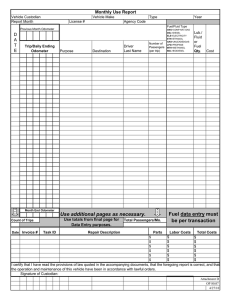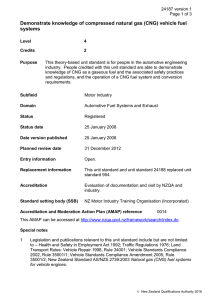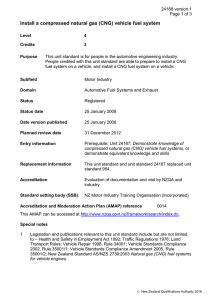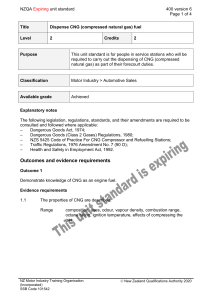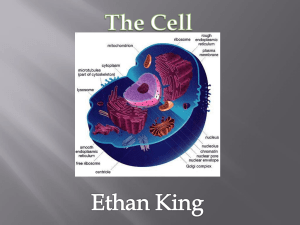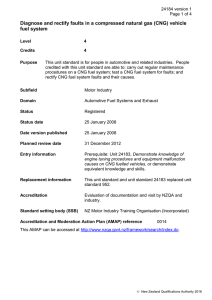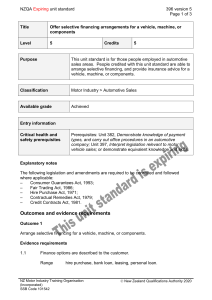NZQA unit standard 954 version 5
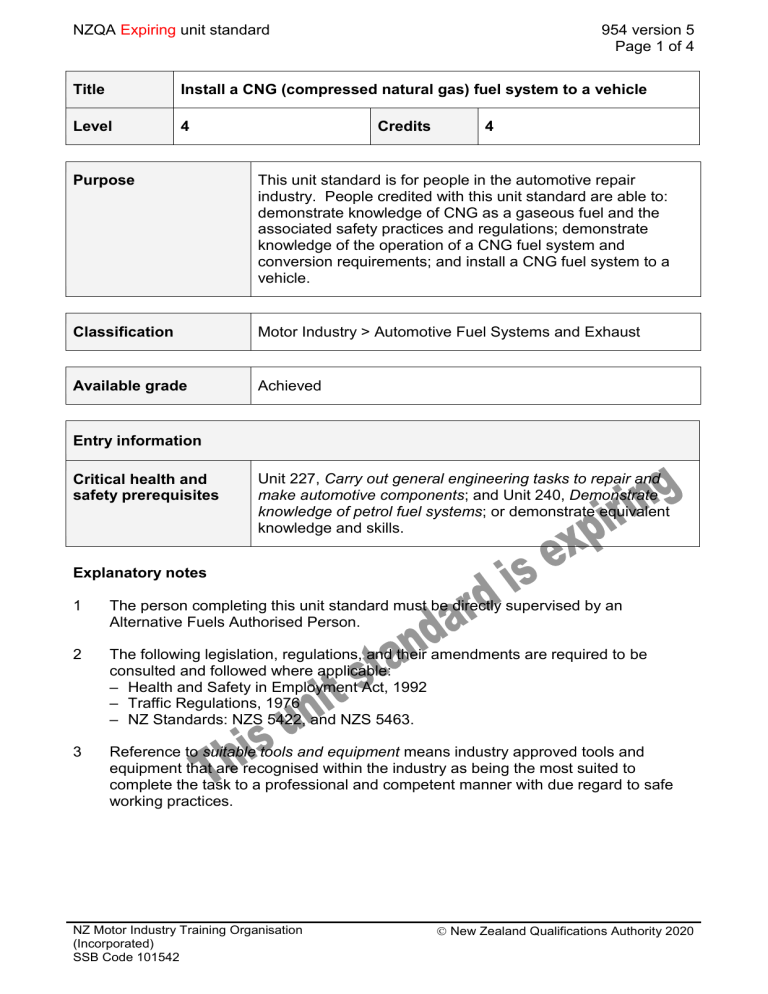
NZQA Expiring unit standard
Title
954 version 5
Page 1 of 4
Install a CNG (compressed natural gas) fuel system to a vehicle
4 Credits 4 Level
Purpose This unit standard is for people in the automotive repair industry. People credited with this unit standard are able to: demonstrate knowledge of CNG as a gaseous fuel and the associated safety practices and regulations; demonstrate knowledge of the operation of a CNG fuel system and conversion requirements; and install a CNG fuel system to a vehicle.
Classification
Available grade
Entry information
Motor Industry > Automotive Fuel Systems and Exhaust
Achieved
Critical health and safety prerequisites
Unit 227, Carry out general engineering tasks to repair and make automotive components ; and Unit 240, Demonstrate knowledge of petrol fuel systems ; or demonstrate equivalent knowledge and skills.
Explanatory notes
1 The person completing this unit standard must be directly supervised by an
Alternative Fuels Authorised Person.
2 The following legislation, regulations, and their amendments are required to be consulted and followed where applicable:
– Health and Safety in Employment Act, 1992
– Traffic Regulations, 1976
– NZ Standards: NZS 5422, and NZS 5463.
3 Reference to suitable tools and equipment means industry approved tools and equipment that are recognised within the industry as being the most suited to complete the task to a professional and competent manner with due regard to safe working practices.
New Zealand Qualifications Authority 2020 NZ Motor Industry Training Organisation
(Incorporated)
SSB Code 101542
NZQA Expiring unit standard 954 version 5
Page 2 of 4
Outcomes and evidence requirements
Outcome 1
Demonstrate knowledge of CNG as a gaseous fuel and the associated safety practices and regulations.
Evidence requirements
1.1 The safety practices associated with CNG are described according to legislative and regulative requirements.
Range work area and involvement, vehicle suitability for installation, equipment storage, repairs to the vehicle's alternative fuel componentry, initial refuelling procedures, cylinder de-gassing.
1.2 Petrol and CNG usage are compared.
Range characteristics, engine performance, engine and associated component effects, suitability for vehicle applications.
1.3 Alternative fuel requirements relating to amendments No. 7 and No. 15 of the
Traffic Regulations, 1976, are identified.
Outcome 2
Demonstrate knowledge of the operation of a CNG fuel system and conversion requirements.
Evidence requirements
2.1 The layouts of dual fuel and dedicated CNG fuel systems are described and the function of each component is defined, according to the equipment manufacturer's service information.
2.2 The operation of a complete assembled dual fuel system is described according to manufacturer’s kit instructions.
2.3 The factors determining the economics of conversion are identified.
Range annual fuel usage, vehicle use and area of operation, conversion cost, pay-back period.
2.4 The procedure when planning the CNG equipment layout on a vehicle is described according to manufacturer’s kit instructions.
Range customer requirements and usage, suitability of components to the vehicle, determining cylinder size, type of vehicle and manufacturer's design requirements relating to modifications, conversion equipment specifications.
New Zealand Qualifications Authority 2020 NZ Motor Industry Training Organisation
(Incorporated)
SSB Code 101542
NZQA Expiring unit standard
Outcome 3
Install a CNG fuel system to a vehicle.
Evidence requirements
3.1
954 version 5
Page 3 of 4
Safety precautions are taken when carrying out the installation according to
NZS 5422 and NZS 5463.
3.2 The vehicle is inspected prior to installing CNG equipment, and the suitability for conversion is determined and reported to the supervisor.
3.3 The vehicle's particular application is verified with the owner, and the acceptability of conversion equipment relating to engine capacity is determined.
3.4 Suitable tools and equipment are selected and used to enable the installation to be carried out.
3.5 The CNG conversion system is installed following the recommended fitting sequences and procedures stated in NZS 5422, Part 2 and in the equipment manufacturer's instructions.
3.6 The vehicle's CNG system is commissioned following the procedure stated in
NZS 5422, Part 2 and the equipment manufacturer's instructions.
Range initial inspection, check on compliance, leak test, installation certificate issue, periodic inspection certificate issue.
3.7 The engine is tuned to obtain optimum performance.
Range to vehicle manufacturer's specifications where they exist otherwise to CNG equipment specifications; ignition system components, petrol carburettor adjustments and modifications, exhaust emission relating to air fuel ratio, adaptation to electronic fuel injection systems, exhaust emission controls, driveability.
Replacement information This unit standard has been replaced by unit standard
24187 and unit standard 24188.
This unit standard is expiring. Assessment against the standard must take place by the last date for assessment set out below.
New Zealand Qualifications Authority 2020 NZ Motor Industry Training Organisation
(Incorporated)
SSB Code 101542
NZQA Expiring unit standard 954 version 5
Status information and last date for assessment for superseded versions
Page 4 of 4
Process Version Date Last Date for Assessment
Registration
Review
1
2
9 November 1993
4 October 1996
31 December 2016
31 December 2016
Review
Review
3
4
26 February 1999
25 January 2008
31 December 2016
31 December 2016
Rollover 5 19 November 2010 31 December 2016
Accreditation and Moderation Action Plan (AMAP) reference 0014
This AMAP can be accessed at http://www.nzqa.govt.nz/framework/search/index.do
.
Please note
Providers must be granted consent to assess against standards (accredited) by NZQA, or an inter-institutional body with delegated authority for quality assurance, before they can report credits from assessment against unit standards or deliver courses of study leading to that assessment.
Industry Training Organisations must be granted consent to assess against standards by
NZQA before they can register credits from assessment against unit standards.
Providers and Industry Training Organisations, which have been granted consent and which are assessing against unit standards must engage with the moderation system that applies to those standards.
Consent requirements and an outline of the moderation system that applies to this standard are outlined in the Accreditation and Moderation Action Plan (AMAP). The
AMAP also includes useful information about special requirements for organisations wishing to develop education and training programmes, such as minimum qualifications for tutors and assessors, and special resource requirements.
NZ Motor Industry Training Organisation
(Incorporated)
SSB Code 101542
New Zealand Qualifications Authority 2020
